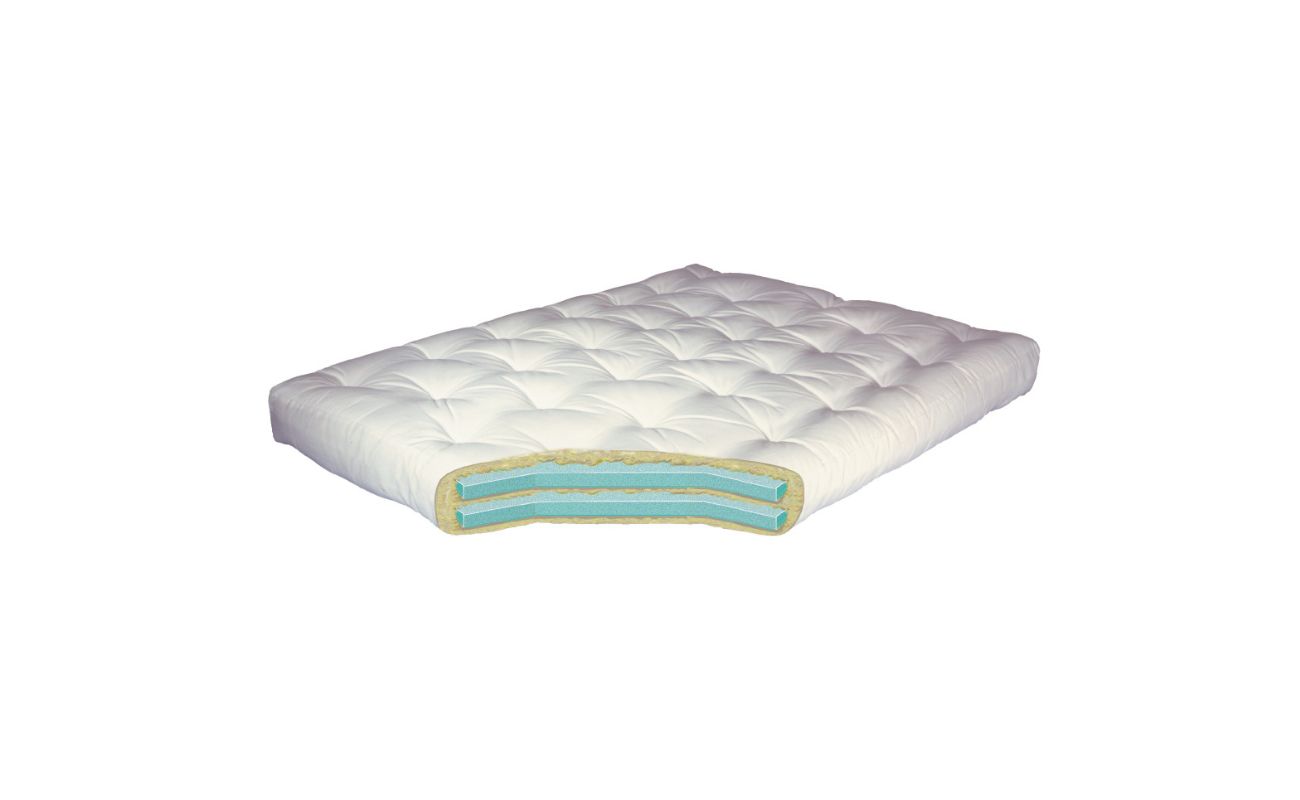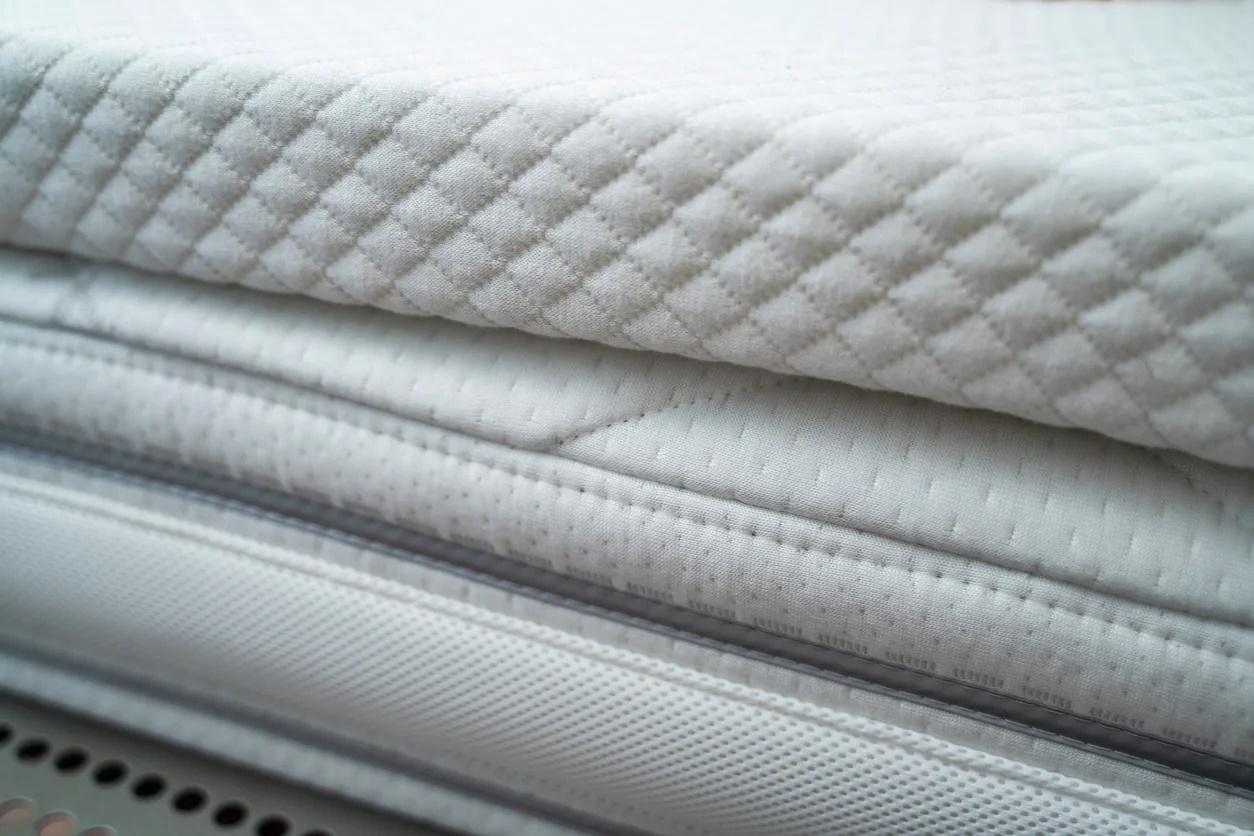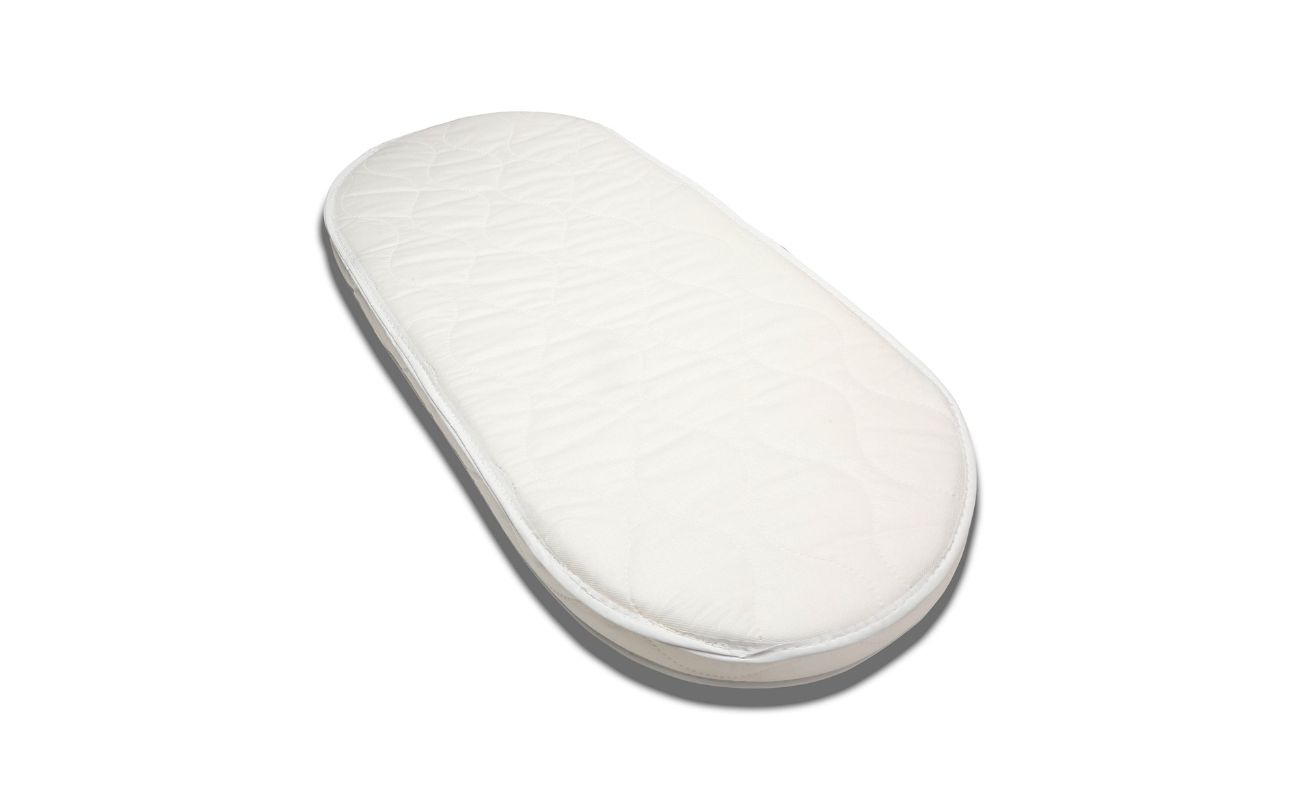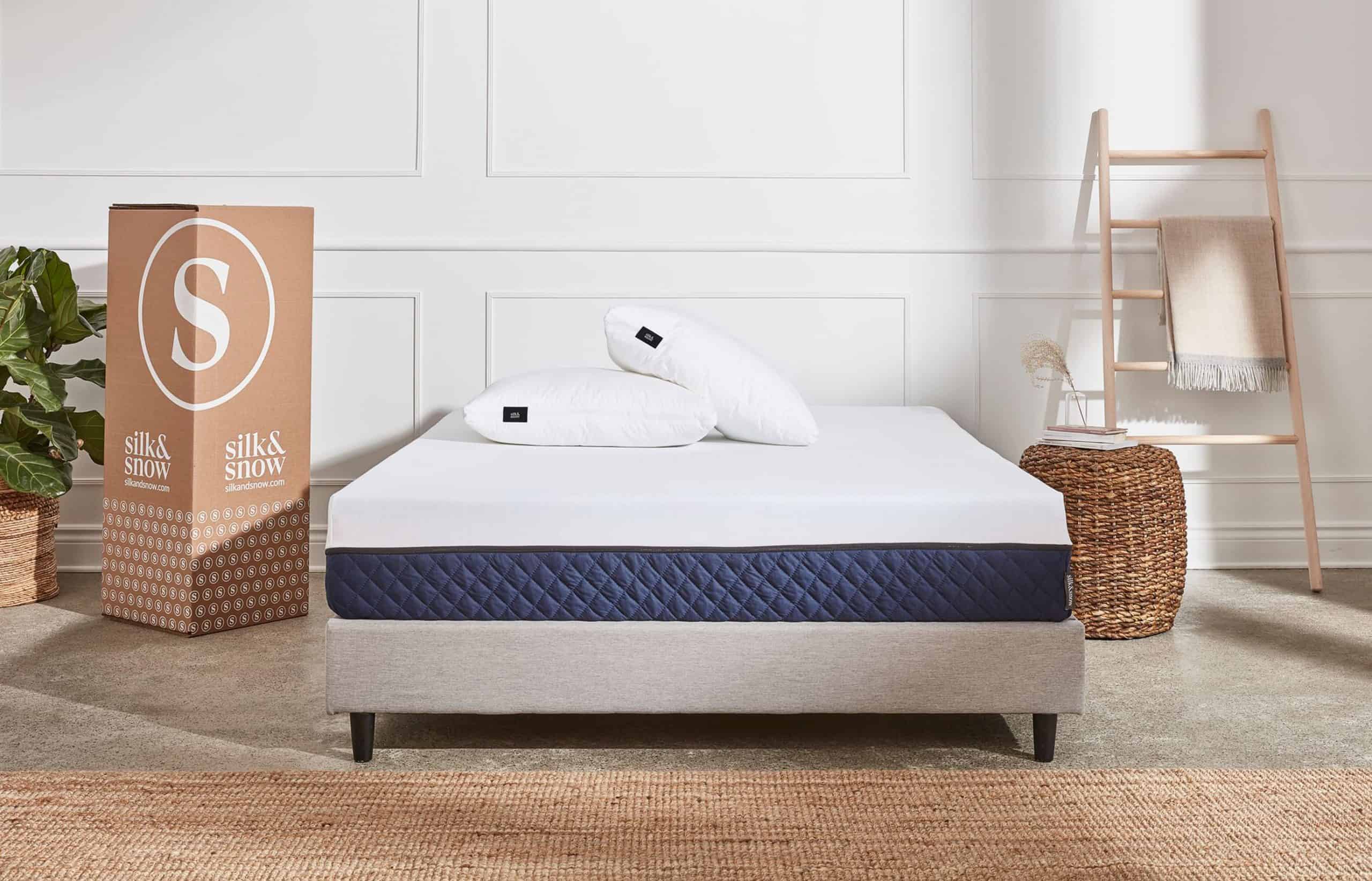Home>Furniture>Bedroom Furniture>What Is A Standard Mattress Thickness
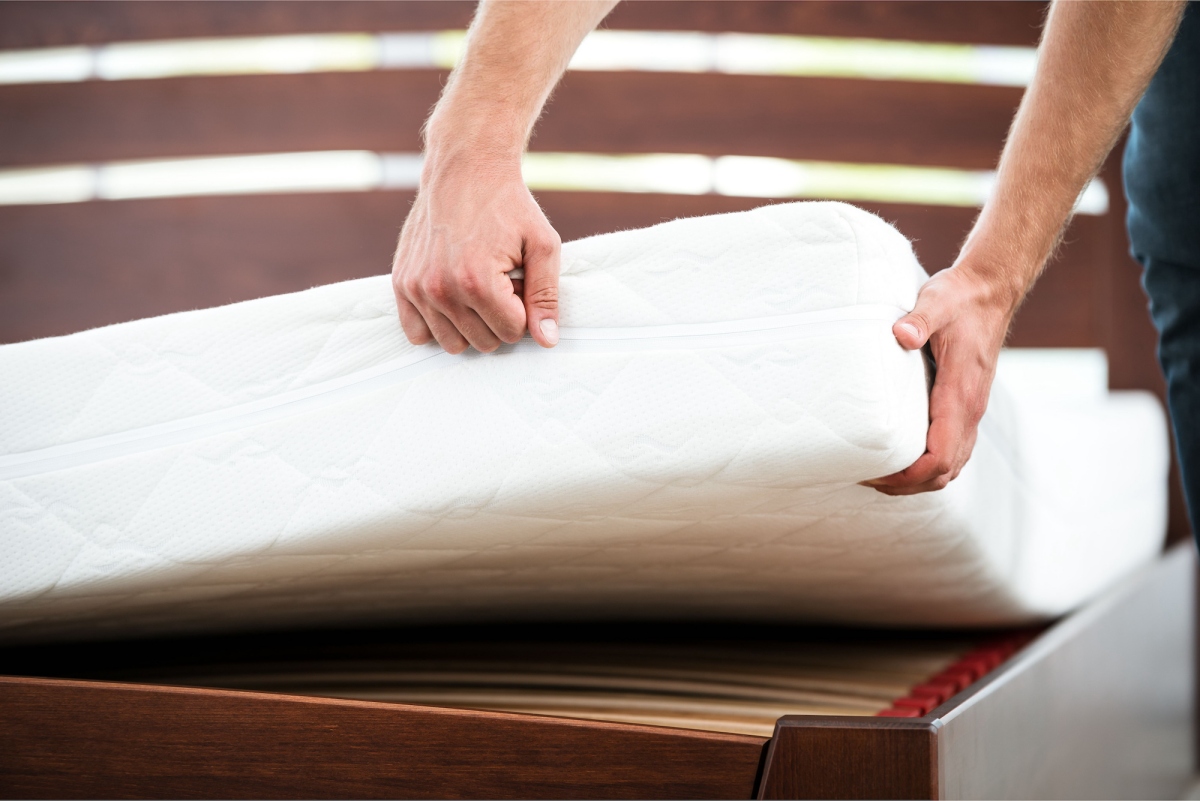

Bedroom Furniture
What Is A Standard Mattress Thickness
Modified: September 1, 2024
Discover the ideal mattress thickness for your bedroom furniture. Learn what is considered a standard thickness and how to choose the right one for your needs.
(Many of the links in this article redirect to a specific reviewed product. Your purchase of these products through affiliate links helps to generate commission for Storables.com, at no extra cost. Learn more)
Introduction
A good night’s sleep is crucial for our overall well-being, and a comfortable mattress is an essential factor in achieving that. When shopping for a new mattress, you may come across terms like “mattress thickness” or “mattress height.” But what exactly does it mean, and why is it important?
In this article, we will delve into the world of mattress thickness and explore its significance in choosing the perfect mattress for your bedroom. We will also discuss the various factors that can affect mattress thickness and provide insights into the standard thicknesses available in the market.
Understanding mattress thickness can help you make an informed decision and ensure that you find a mattress that meets your needs in terms of comfort, support, and aesthetics. So, let’s dive in and explore the fascinating world of mattress thickness!
Key Takeaways:
- The thickness of a mattress impacts comfort, support, and aesthetics. Consider factors like sleeping position, body weight, and personal preference to choose the ideal thickness for a restful sleep experience.
- Different mattress thicknesses offer unique benefits, from cost-effectiveness to luxurious comfort. Test out options in person and prioritize your comfort preferences to find the perfect mattress thickness for a rejuvenating sleep.
Read more: How Thick Is Standard Printer Paper
Importance of Mattress Thickness
The thickness of a mattress plays a crucial role in determining its comfort level and overall performance. It not only affects how the mattress feels when you lie down, but also how well it supports your body and relieves pressure points.
One of the primary reasons why mattress thickness is important is because it provides adequate support for your body. A mattress that is too thin may not provide enough cushioning and support, leading to discomfort and increased pressure on certain areas of your body. On the other hand, a mattress that is too thick may feel overly firm and lack proper contouring, leading to discomfort and poor spinal alignment.
Another important aspect of mattress thickness is its impact on the aesthetics of your bedroom. A mattress with the right thickness can add visual appeal and enhance the overall look and feel of your sleeping space. It can create a sense of luxury and sophistication, especially when paired with the right bed frame and accessories.
Furthermore, mattress thickness can also affect the ease of getting in and out of bed. A mattress that is too low to the ground may require more effort to sit or stand, especially for individuals with mobility issues. On the other hand, a mattress that is too high may pose challenges, especially for shorter individuals or those with limited mobility.
Lastly, considering mattress thickness is crucial when it comes to ensuring the longevity and durability of your mattress. A thicker mattress generally has more layers of padding and support materials, which can provide better durability and longevity compared to thinner mattresses.
Overall, the importance of mattress thickness lies in its ability to provide adequate support, enhance the aesthetic appeal of your bedroom, impact ease of movement, and contribute to the durability of your mattress. It is essential to find the right balance and choose a mattress thickness that meets your comfort preferences, physical needs, and personal style.
Factors That Affect Mattress Thickness
When it comes to mattress thickness, several factors come into play. Understanding these factors can help you make an informed decision and select the right mattress thickness for your specific needs. Let’s take a look at some of the key factors that can affect mattress thickness:
- Comfort Level: The desired level of comfort can influence the ideal mattress thickness. Some individuals prefer a plush, soft mattress with more cushioning layers, while others prefer a firmer mattress with minimal cushioning. The level of comfort you prefer will impact the overall thickness of the mattress.
- Support Needs: The level of support your body requires is another vital factor to consider. If you have specific support needs, such as back pain or joint issues, you may require a thicker mattress with adequate support layers to provide proper alignment and pressure relief.
- Sleeping Position: Your sleeping position can also affect the optimal mattress thickness. Different sleeping positions put varying amounts of pressure on different parts of the body. For example, side sleepers may benefit from a thicker mattress to provide better cushioning for their shoulders and hips, while stomach sleepers may prefer a firmer and thinner mattress for proper spinal alignment.
- Body Weight: Your body weight can also impact the ideal mattress thickness. Heavier individuals may require a thicker mattress with additional support layers to ensure proper weight distribution and prevent sagging. Lighter individuals, on the other hand, may find thinner mattresses more comfortable.
- Bed Frame Design: The design and height of your bed frame can influence the mattress thickness. Some bed frames have specific requirements for mattress thickness, such as platform beds or adjustable bases. It is essential to consider these requirements when choosing a mattress.
- Personal Preference: Ultimately, personal preference plays a significant role in determining the ideal mattress thickness. Some individuals may prefer the feeling of being closer to the ground with a thinner mattress, while others may enjoy the sensation of being enveloped in comfort with a thicker mattress.
Considering these factors can help you narrow down your options and choose the right mattress thickness that aligns with your comfort preferences, support needs, sleeping position, body weight, bed frame design, and personal preferences.
Standard Mattress Thicknesses
When shopping for a mattress, you’ll come across various thickness options. While there’s no one-size-fits-all answer to the ideal mattress thickness, understanding the standard thicknesses available can help you make an informed decision. Here are the most common standard mattress thicknesses:
- 6 to 8 inches: This is the standard thickness for budget-friendly mattresses or mattresses designed for children’s beds or bunk beds. These thinner mattresses can be suitable for individuals who prefer a firmer surface or have limited space.
- 10 to 12 inches: This is the most common thickness range for mattresses. They provide a balanced combination of comfort and support, catering to a wide range of sleepers. They typically consist of multiple layers, including the comfort layer, support layer, and base layer.
- 14 to 16 inches: These mattresses are considered plush and luxurious. They often include additional cushioning layers or a pillow-top for enhanced comfort. They can provide extra support and pressure relief, particularly for individuals with specific needs or preferences.
- 18 inches and above: These are the thickest mattresses available in the market. They are often found in luxury and high-end bedding collections. These mattresses offer exceptional comfort, support, and a substantial presence in the bedroom. They are ideal for individuals who prioritize a plush and indulgent sleep experience.
It’s important to note that these standard thicknesses can vary slightly between different mattress manufacturers. Additionally, custom and specialty mattresses may have unique thickness options based on specific needs or materials used.
When considering the standard thicknesses, it’s crucial to keep in mind your comfort preferences, support needs, and other factors mentioned earlier. Trying out different mattress thicknesses in person or researching customer reviews can help you choose the right thickness that aligns with your sleep preferences and requirements.
Twin and Twin XL Mattress Thickness
Twin and Twin XL mattresses are commonly used in children’s rooms, guest rooms, or for individuals who prefer a smaller bed size. These mattresses come in various thickness options to cater to different comfort preferences and support needs. Here’s a breakdown of the typical mattress thicknesses for Twin and Twin XL sizes:
- 6 to 8 inches: Thinner Twin and Twin XL mattresses are often found in budget-friendly options or for individuals who prefer a firmer surface. These mattresses can provide adequate support and comfort for children or individuals with limited space.
- 10 to 12 inches: This is the most common thickness range for Twin and Twin XL mattresses. They offer a balanced combination of comfort and support, making them suitable for a wide range of sleepers. These mattresses usually consist of multiple layers, including a comfort layer, support layer, and base layer.
- 14 to 16 inches: Thicker Twin and Twin XL mattresses are typically considered plush and luxurious. They often include additional cushioning layers or a pillow-top for enhanced comfort. These mattresses can provide extra support and pressure relief, ideal for individuals who prioritize a plush sleep experience.
- 18 inches and above: While less common, there are also Twin and Twin XL mattresses available in 18 inches and above thickness. These mattresses are usually found in luxury or specialty bedding collections. They offer exceptional comfort, support, and a more substantial presence in the bedroom.
It’s important to consider factors such as body weight, sleeping position, and personal preferences when selecting the ideal mattress thickness. Trying out different options in person or reading customer reviews can also help you gauge the level of comfort and support provided by different thicknesses.
Remember, choosing the right mattress thickness for your Twin or Twin XL bed can contribute to a restful night’s sleep and ensure that you wake up refreshed and rejuvenated in the morning.
Read more: How Thick Is The Nectar Mattress
Full and Queen Mattress Thickness
Full and Queen mattresses are popular choices for couples or individuals who prefer more sleeping space. These mattress sizes offer a comfortable balance between size and functionality. When it comes to mattress thickness, Full and Queen mattresses come in various options to cater to different comfort preferences and support needs. Here’s a breakdown of the typical mattress thicknesses for Full and Queen sizes:
- 8 to 10 inches: Thinner Full and Queen mattresses are commonly found in budget-friendly options or for those who prefer a firmer sleep surface. These mattresses can provide adequate support and comfort, particularly for individuals with smaller frames or who prefer a firmer feel.
- 10 to 12 inches: This is the most common thickness range for Full and Queen mattresses. They offer a balanced combination of comfort and support, catering to a wide range of sleepers. These mattresses typically consist of multiple layers, including a comfort layer, support layer, and base layer.
- 12 to 14 inches: Thicker Full and Queen mattresses are often considered more luxurious and plush. They can provide extra cushioning and enhanced pressure relief. These mattresses are ideal for those who prefer a softer, more enveloping sleep surface or individuals with specific comfort needs.
- 14 to 16 inches: While less common, there are also Full and Queen mattresses available in 14 to 16 inches thickness. These mattresses often include additional cushioning layers or a pillow-top for enhanced comfort. They offer a luxurious sleep experience with excellent support and pressure relief.
It’s important to consider factors such as sleeping position, body weight, and personal preferences when selecting the ideal mattress thickness. Trying out different thickness options in person or reading customer reviews can provide valuable insights into the comfort and support offered by various options.
Keep in mind that the overall thickness of the mattress may also affect the height of the bed, so consider your bed frame and any specific requirements it may have. Finding the right mattress thickness for your Full or Queen bed can contribute to a comfortable and restful sleep, ensuring you wake up feeling refreshed and ready to take on the day.
King and California King Mattress Thickness
King and California King mattresses are the largest standard mattress sizes available. These spacious mattresses are popular choices for couples or individuals who desire ample space for comfortable sleep. When it comes to mattress thickness, King and California King mattresses come in various options to cater to different comfort preferences and support needs. Here’s a breakdown of the typical mattress thicknesses for King and California King sizes:
- 8 to 10 inches: Thinner King and California King mattresses are commonly found in budget-friendly options or for those who prefer a firmer sleep surface. These mattresses can provide sufficient support and comfort, particularly for individuals with smaller frames or who prefer a firmer feel.
- 10 to 12 inches: This is the most common thickness range for King and California King mattresses. They offer a balanced combination of comfort and support, suitable for a wide range of sleepers. These mattresses typically consist of multiple layers, including a comfort layer, support layer, and base layer.
- 12 to 14 inches: Thicker King and California King mattresses are often considered more luxurious and plush. They offer extra cushioning and enhanced pressure relief for a comfortable sleep experience. These mattresses are ideal for individuals who prefer a softer, more enveloping feel or have specific comfort needs.
- 14 to 16 inches: There are also King and California King mattresses available in 14 to 16 inches thickness. These mattresses often include additional cushioning layers or a pillow-top for added comfort. They offer a luxurious sleep experience with excellent support and pressure relief.
When selecting the ideal mattress thickness for your King or California King bed, it’s important to consider factors such as sleeping position, body weight, and personal preferences. Trying out different thickness options in person or reading customer reviews can help you gauge the comfort and support provided by different thicknesses.
Remember to consider the overall height of the bed and any specific requirements of your bed frame when choosing the mattress thickness. Finding the right thickness for your King or California King mattress can contribute to a restful and rejuvenating sleep experience, allowing you to wake up refreshed and ready to tackle the day ahead.
Benefits of Different Mattress Thicknesses
When it comes to mattress thickness, there are advantages to be found at various levels. The ideal thickness for you will depend on your individual preferences, body type, and sleep needs. Let’s explore the benefits of different mattress thicknesses to help you make an informed decision:
Thin Mattresses (6 to 8 inches)
- Cost-effective: Thin mattresses are often more budget-friendly, making them an attractive option for individuals on a tight budget.
- Firmer Support: Thinner mattresses tend to provide a firmer level of support, which can be beneficial for individuals who prefer a more solid sleep surface.
- Space Saving: If you have limited space in your bedroom, a thin mattress can be advantageous as it takes up less vertical space.
Read more: How Thick Is A Casper Mattress
Medium Thickness Mattresses (10 to 12 inches)
- Comfortable Support: Medium thickness mattresses strike a balance between comfort and support, offering a comfortable sleeping surface with adequate support for most sleepers.
- Wider Range of Options: This is the most common thickness range, meaning you’ll have a wider variety of mattress options to choose from, including different firmness levels and materials.
- Versatility: Medium thickness mattresses can accommodate various sleep positions and body types, making them a versatile choice for different individuals.
Thicker Mattresses (14 to 16 inches and above)
- Luxurious Comfort: Thicker mattresses generally provide a more luxurious and plush sleep experience, with extra layers of cushioning for enhanced comfort and pressure relief.
- Enhanced Support: Thicker mattresses often offer more support layers, making them suitable for individuals with specific support needs or those who prefer a more enveloping feel.
- Aesthetically Pleasing: Thicker mattresses can create a visually appealing focal point in your bedroom, adding a sense of luxury and sophistication to your sleep space.
Remember, the benefits of different mattress thicknesses are subjective and depend on your individual preferences and needs. It’s essential to consider factors such as comfort, support, and aesthetics when selecting the right thickness for your mattress.
Additionally, it’s always a good idea to test out different thicknesses in person or read customer reviews to get a better understanding of how each thickness level feels and performs. By finding the perfect mattress thickness for you, you can maximize your sleep comfort and wake up feeling refreshed each morning.
Choosing the Right Mattress Thickness for You
Choosing the right mattress thickness is an essential part of creating a comfortable and supportive sleep environment. To help you make the best decision for yourself, consider the following factors:
Comfort and Support:
Consider your comfort preferences and the level of support your body needs. Thicker mattresses generally provide more cushioning and can be beneficial for individuals who prefer a softer and more luxurious sleep experience. Thinner mattresses, on the other hand, offer firmer support and may be suitable for those who prefer a more solid sleep surface.
Read more: How Thick Is The Average Mattress
Sleeping Position:
Take into account your primary sleeping position. Side sleepers may benefit from a thicker mattress that offers better contouring and pressure relief for the shoulders and hips. Back and stomach sleepers may prefer a mattress with a medium thickness that provides adequate support and promotes proper spinal alignment.
Body Weight:
Consider your body weight when choosing mattress thickness. Heavier individuals may require a thicker mattress to ensure sufficient support and prevent sagging. Lighter individuals may find thinner mattresses more comfortable.
Bed Frame Design:
Take into consideration the design and height of your bed frame. Some bed frames have specific requirements for mattress thickness, so ensure that your chosen mattress thickness is compatible with your bed frame. Additionally, consider the overall height of the bed and how it aligns with your needs and preferences.
Personal Preference:
Remember that personal preference plays a significant role in choosing the right mattress thickness. Consider your own preferences and the type of sleep experience you desire. Do you prefer a plush and cushiony feel, or do you like a more firm and supportive surface? Trust your instincts and choose a thickness that aligns with your personal comfort preferences.
It’s also helpful to try out mattresses in person whenever possible. Visit mattress stores or showrooms to test different thickness options and determine which one feels the most comfortable and supportive for you. Additionally, reading customer reviews and seeking recommendations can provide valuable insights into the quality and performance of different mattress thicknesses.
Ultimately, selecting the right mattress thickness is a personal decision. By considering your comfort preferences, support needs, sleeping position, body weight, bed frame design, and personal preferences, you can find the perfect mattress thickness that promotes restful and rejuvenating sleep every night.
When choosing a standard mattress, consider a thickness of at least 8 inches for adequate support and comfort. Thicker mattresses (10-12 inches) are better for heavier individuals or those who prefer a more plush feel.
Read more: How Thick Is An Awara Mattress
Conclusion
Choosing the right mattress thickness is crucial for creating a comfortable sleep environment tailored to your unique needs and preferences. The thickness of a mattress affects its support, comfort, and overall feel. By considering factors such as comfort preferences, support needs, sleeping position, body weight, bed frame design, and personal preferences, you can make an informed decision when selecting the ideal mattress thickness.
There is no one-size-fits-all answer when it comes to mattress thickness. Different thickness options offer various benefits and cater to different sleepers. Thin mattresses are ideal for those on a budget or individuals who prefer a firmer sleep surface. Medium thickness mattresses strike a balance between comfort and support, catering to a wide range of sleep preferences. Thicker mattresses provide a luxurious and plush sleep experience with enhanced support and pressure relief.
It’s important to try out different thickness options in person whenever possible and read customer reviews to get a better understanding of how each thickness level feels and performs. Consider your comfort, support, and aesthetic preferences when making a decision and ensure compatibility with your bed frame.
Remember, the right mattress thickness can contribute to a more restful and rejuvenating sleep, allowing you to wake up refreshed and ready to take on the day. Take the time to find the perfect mattress thickness for you, and prioritize your sleep comfort and well-being. Sweet dreams!
Frequently Asked Questions about What Is A Standard Mattress Thickness
Was this page helpful?
At Storables.com, we guarantee accurate and reliable information. Our content, validated by Expert Board Contributors, is crafted following stringent Editorial Policies. We're committed to providing you with well-researched, expert-backed insights for all your informational needs.
